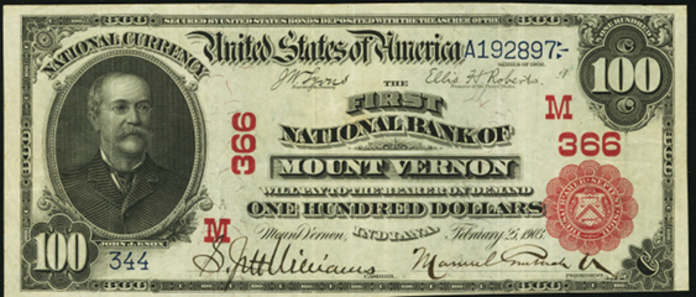One Hundred Dollar Notes › Nationals › 1902 One Hundred Dollar National Bank Notes › New York Charters › 1902 $100 Amityville New York First National Bank
Get Value Now
| Item | Info |
|---|---|
| Series | 1902 |
| Charter | #8873 First National Bank of Amityville, New York |
| Year Chartered | 1907, 490 Banks Chartered |
| City Info | Amityville is a village in the town of Babylon in Suffolk County, New York, in the United States. The population was 9,523 at the 2010 census. Huntington settlers first visited the Amityville area in 1653 as a source of salt hay. Chief Wyandanch granted the first deed to land in Amityville in 1658. The area was originally called Huntington West Neck South it is on the Great South Bay and Suffolk County, New York border in the southwest corner of what once called Huntington South but is now the Town of Babylon. According to village lore, the name was changed in 1846 when residents were working to establish its new post office. The meeting turned into bedlam and one participant was to exclaim, "What this meeting needs is some amity". Another version says the name was first suggested by mill owner Samuel Ireland to name the town for his boat, the Amity. Source: Wikipedia |
| Similar Cities | City name is unique, no others like it. |
| Seal Varieties | Red, Blue |
| Other Info | 1. Value depends on notes known for charter, condition and market demand. |
| Neat Fact | Check your note's serial number. Serial #1 notes are valuable, even on common charters. Serial numbers 2-4 are also desirable in some cases. |
No Obligations Offers and Appraisals
Please submit a good photo or scan. It will be identified and evaluated. Understand there may be subtle differences between the image you see above and your note. Signatures, design, markings and note condition will determine the offer price. Notes in Uncirculated or better condition receive the best offers.
Appraisals can be estimated for wholesale and retail prices. Wholesale is what dealers typically pay. Retail is what a collector might pay. Retail is slightly higher in most cases.
Please visit this page for USA Paper Money Reference. Do not treat this page as a reference guide, it is for appraisal and acquisition purposes only.
